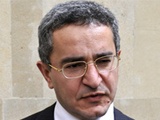|
|
TODAY.AZ / Politics
Azerbaijani Foreign Ministry: UN international court's advisory opinion relates to Kosovo
23 July 2010 [16:17] - TODAY.AZ
Kosovo conflict is as unique as all other conflicts. There is no single method to resolve it, the Azerbaijani Foreign Ministry spokesman Elkhan Polukhov said.
 "Azerbaijan recognizes the territorial integrity of Serbia and is committed to this position," Polukhov said.
"Azerbaijan recognizes the territorial integrity of Serbia and is committed to this position," Polukhov said.As to the advisory of the UN International Court of Justice, it only applies to the Kosovo case, he said.
The settlement of the Armenian-Azerbaijani Nagorno-Karabakh conflict is carried out under the OSCE mandate within the Minsk Group. Azerbaijan continues to negotiate in the same format. On Thursday, Chairman of the UN International Court of Justice Hisashi Owada (Japan) issued an advisory opinion at a public meeting in the Hague.
The International Court is the principal judicial organ of the UN, which is competent to consider disputes between countries and make advisory opinions on any legal question at the request of the General Assembly or the UN Security Council.
Its advisory opinions have no compulsory power, as opposed to the decisions of the UN International Court, but may cause political consequences.
He said that the declaration of independence by Kosovo in February 2008 has not violated the international law. Albanian authorities in Kosovo unilaterally declared independence of Kosovo from Serbia supported by the U.S. and several EU countries Feb. 17, 2008. It was recognized by 69 of 192 UN member-countries.
Serbia, as well as Russia, China, India and several other influential countries refused from recognizing Kosovo.
Kosovo was under UN administration and KFOR international force led by NATO since summer of 1999 in accordance with the UN Security Council Resolution 1244. The UN Security Council Resolution 1244 confirms the territorial integrity of the Federal Republic of Yugoslavia (now Serbia), and also calls for a decision on Kosovo's final status.
/Trend/
URL: http://www.today.az/news/politics/71333.html
 Print version
Print version
Views: 1167
Connect with us. Get latest news and updates.
See Also
- 17 August 2025 [15:58]
Diaspora groups push provocations as Baku-Yerevan relations slowly improve - 17 August 2025 [11:44]
President Ilham Aliyev congratulates Indonesian President Prabowo Subianto - 16 August 2025 [16:21]
Azerbaijani Ambassador: We now have real chance to move beyond conflict with Armenia - 16 August 2025 [15:47]
Azerbaijani and Ukrainian Foreign Ministers hold phone conversation - 16 August 2025 [14:46]
Azerbaijani Air Force conducts training flights - 16 August 2025 [13:40]
Azerbaijan extends condolences to Pakistan over deadly floods - 16 August 2025 [13:28]
President Ilham Aliyev awards State Border Service personnel - 16 August 2025 [12:55]
Swedish Platform highlights President Ilham Aliyev’s strategic role in South Caucasus - 16 August 2025 [12:25]
Attempt to illegally cross Iran-Azerbaijan border prevented, over 12 kg of narcotics seized - 16 August 2025 [11:32]
World Health Organization chief sends congratulatory letter to President Ilham Aliyev
Most Popular
 Azerbaijani and Ukrainian Foreign Ministers hold phone conversation
Azerbaijani and Ukrainian Foreign Ministers hold phone conversation
 Azerbaijani Ambassador: We now have real chance to move beyond conflict with Armenia
Azerbaijani Ambassador: We now have real chance to move beyond conflict with Armenia
 Partnership opportunities discussed for "Green and Digital Silk Road" Accelerator under Startup School 3
Partnership opportunities discussed for "Green and Digital Silk Road" Accelerator under Startup School 3
 European leaders draft joint statement following Trump-Putin talks in Alaska
European leaders draft joint statement following Trump-Putin talks in Alaska
 Azerbaijani Air Force conducts training flights
Azerbaijani Air Force conducts training flights
 Global firms eye alternatives as US trade policy grows unpredictable
Global firms eye alternatives as US trade policy grows unpredictable
 Series of earthquakes strike near Russia's Kamchatka Peninsula
Series of earthquakes strike near Russia's Kamchatka Peninsula
